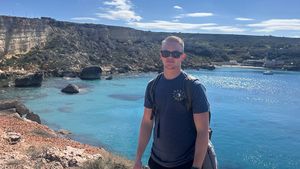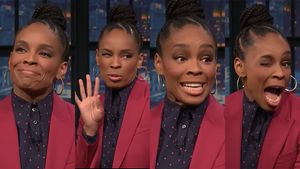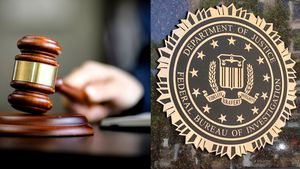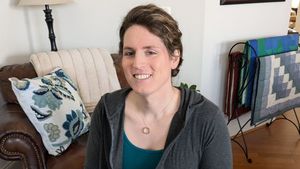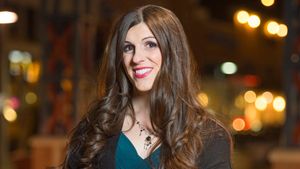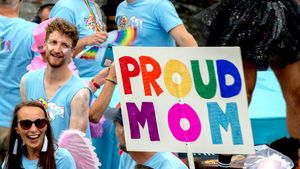Alec Mapa is the sharp-witted comic/actor known from flamboyant parts like Eva Longoria's personal shopper, Vern, on Desperate Housewives and fashion reporter Suzuki St. Pierre on Ugly Betty. But Alec's best role of all is himself, which he plays to the hilt in a one-gaysian show called Alec Mapa: I Remember Mapa, coming to the Baruch Performing Arts Center in New York City this Saturday, Oct. 11. It's described as "the comic journey of a gay Filipino actor struggling for work, love, and acceptance," and, fortunately, that journey involved a zippy phone chat with me about his trek from bar back to husband and father, along with the requisite comments about the dumbing down of gay society and how that affects our love lives.
Musto: Hi, Alec. How are you?
Alec Mapa: Good. I just saw you in the documentary about [late drag star] Divine. There's going to be no one left to talk about the old days when New York was dirty and dangerous. You know, I worked at Boy Bar [a popular NYC gay bar]. I was a bar back, and I had go to that scary basement below that fire trap dance floor and connect all the soda pops to the bar. I also had to check the bathroom once an hour to make sure no one was fucking or shooting up. It was the East Village in the '80s and there were no safety codes. It was like Indiana Jones and the Temple of Doom--so scary.
Terrifying! But let's bring it all back! So you're coming to Baruch?
To discuss the Talmud [laughs] and to do my show, which is about moving to New York in the '80s and getting my first job, in the original company of M. Butterfly.
But I thought B.D. Hyman was the original star. [It was B.D. Wong, not B.D. Hyman, who was Bette Davis' daughter. But Alec got the joke and kept going with it.]
Yes, it was B.D. Hyman, and I was his understudy and a dancer. I went on a lot because B.D. started to get movies and do a lot of media. I went on a lot six months into the run, and I did the last seven months with Tony Randall.
Did you have to tuck for the part?
No, because there was so much bullshit under the clothes. But there were some nights I should have tucked. I was 24, and I had the metabolism of a hummingbird, so I was emaciated.
Were you aiming to be a legit actor or go into comedy?
I was a classically trained actor. I went to NYU and studied Moliere and Shakespeare, so when I got that job, it was pretty much an affirmation of what I trained for. Then I went to L.A. and didn't work for almost three years. I had a complete nervous breakdown. I couldn't get a part in my hair. But when I started performing my solo shows again, it got me sitcoms. People who worked in TV saw it.
But at first, you were hard to peg?
They didn't know what to do with me. I figured I might as well make work for myself. The whole point of the show [I Remember Mapa] is you learn more from failure than success. The thing that failure gave me was a voice because I knew no one was going to come rescue me, and I had to get up and do my own thing.
Did you have any terrible standup experiences along the way?
Always. There was the Cactus Club in Newark, New Jersey, which in the '80s was a gay strip club. My intro was: "We have a comic here from New York, and I know we haven't had much luck with these. Here's Alec Mapa." In a strip club, no one wants to see a standup comic, so I flopped big time. In the wings, I saw someone getting fluffed, and he looked at me like, "Maybe my job isn't so bad after all."
Did an audience member ever feel you went too far or shouldn't have gone there?
Not really, though they get a little cranky in Seattle and San Francisco. They get a little finger waggy, which I'm always surprised by because San Francisco is the birthplace of gay politics, and we should be outrageous. There's more and more of the finger wagging lately. In the '80s, when we were all dying and we knew everyone hated us, we stuck together. We were stronger as a community because we had to be, but now we're telling each other what words to use. It seems petty.
There was plenty of P.C. back then too, believe me.
But it was important. It was about life and death stuff.
Speaking of which: What's it like performing on cruises?
On the Atlantis cruises and Rosie cruises; it's great, but they're two completely different experiences. On the Rosie cruise, there are children and on the Atlantis, they act like children.
But you like performing on the high seas?
Yes. The gay audiences forced me to up my game. They're the toughest audience you'll ever have because they're smarter and funnier than anybody, so you have to be quicker than them.
Well, I've met a few pretty dumb gays, lol.
Yeah, there are some dumb ones out there. [laughs] Everyone's getting dumber. We don't have to try as hard. The phone has replaced the gay bar. You used to have to go up and talk to people and be brave, but now that's no longer required. I'm not sure what affect this will have on gay society, but it's already happening. The bars are closing.
Do people confuse you with Margaret Cho?
Sure. We all look alike. [laughs]
How's your wonderful little son, Zion?
He's not so little anymore. He's 9 and wears the same size shoe as me. He started out as a 5-year-old, and now I'm basically living with a big black guy. He's awesome and loves school.
Does he still have that sharp tongue?
He's worse than ever because he has us for parents. He bears no resemblance to the foster kid he was years ago. Recently, I picked him up from day care, and he had a sour look on his face. I said, "What's wrong with you?" He said: "I had a really challenging yoga class." He was a black kid from Compton, but he's now a white woman from Santa Monica.
How is married life for you? [Alec married Jamison Hebert in 2008.]
It's great. I should have done it long ago. We're going on 13 years now [as a couple].
Who wears the pants?
He does. I wear an apron. I'm home most of the time. I'm still doing Switched at Birth on ABC Family, but most of the time I'm dropping the kid at school and cleaning the house. Boys are filthy.
You made a splash with recurring TV roles and supporting parts in movies. Is there a certain type you're called upon to play?
I was always the gay bff to people in their 20s, but now I'm playing bff to women in their 50s. Next I bet I'm going to be playing Betty White's bff!
By the way, that new sitcom Selfie has an Asian male lead, John Cho. Is this a sea change?
I'm selfish, so I'll feel like the revolution is complete when there's a sitcom starring me!
>>>MORE: Broadway's ASPERGER'S DELUXE

Alex Sharp (center) in 'The Curious Incident of the Dog in the Night-Time' | Photo by Joan Marcus
ASPERGER'S DELUXE
An awkward young person navigates through the world of intimidating and awful adults while obsessing on an animal. Sound like Mo' Better Matilda meets War Horse: Part Deux? Well, it's not. It's The Curious Incident of the Dog in the Night-Time, the Olivier-winning play by Simon Stephens, adapted from Mark Haddon's novel about a 15-year-old boy with symptoms of autism who's determined to find out who stuck a "garden fork" in the neighbor's dog and left him for dead. But that's just a springboard for a flashy production that's become "event theater" by nature of the decidedly offbeat staging effects.
Presented as a dramatization of the boy's writings on the subject--complete with winky fourth wall breaking--the story is acted out against a Matrix-like set that becomes the backdrop for innovative projections, stunning flashes of light, and conceptual ensemble movement, the devices propelling the relatively short scenes into a hypnotic state beyond what you'd get in, say, your traditional family drama. As the boy, the strong Alex Sharp can squawk like Gilbert Gottfried, while other times his Christopher seems hopelessly lost in his confusion and/or determination, though the show's perpetual movement leads him to hard facts, along with several important epiphanies. Act 2 has power, but avoid this if you can't stand glorifications of disturbed geniuses who are unbearable to be around, yet are somehow better than everyone else. But see it if you want to immerse yourself in a novel approach to outsider-dom, or if you simply like to follow the sound of buzz.
And then there's a traditional family drama. It's Donald Margulies' The Country House, a bemused poison pen letter to the neurotics that populate the theater--and there are plenty of them to go around, honey. In the play, a bunch of drama queens, male and female, converge upon a Williamstown home at the behest of a grand dame actress past her prime, played by an enjoyably flitty Blythe Danner. Filling the rooms are Blythe's endlessly fuming son, her recently dead daughter's widower, his new fiancee, Blythe's saucy granddaughter, and a handsome TV star who's trapped in a routine of dating too-available models. (His choices greatly expand by the end of the evening, though, since all three female characters make moves on him. Well, he's played by Daniel Sunjata.) Extra complications ensue when it turns out the widower's new fiance happens to be the love of the frustrated son's life, and that same whiny son (called "Uncle Idiot" by the granddaughter, though Unce Vanya would work, too) also hates the widower for having sold out, made tons of money, and never used him in a part. I know the feeling! As the psychodramas play out--including Uncle Idiot's allegation that Blythe was a rotten, discouraging matriarch--it becomes clear that the deceased daughter represented unconditional love, and in her absence, she's left a lot of striving, longing, rage, and eventually a shred of grudging acceptance. There are witty observations and telling moments peppered throughout, but Chekhovian or not, the play's contrivances often seem as thin as the pudding I just made from a recipe on Goop. Still, this is no reason to put a big garden fork in the theater. A new play is always welcome, even without Carole King songs.
Meanwhile, that old chestnut, Rodgers & Hammerstein's Cinderella, was recently spruced up with Douglas Carter Beane-penned jokes and sweeping stagecraft, making for a cannily packaged entertainment about the joys of going from rags to a rich husband. A screechy revolutionary character was added, along with stuff about the poor having been plundered (Those paying $142 for a Broadway show might empathize, lol), but generally the lilting score prevails, along with top-notch costumes, staging, and performances helping sell the mix of sincerity and shtick, particularly in the first half.
The latest Cinderella is Keke Palmer, (the first African-American to play the role on Broadway, though Brandy nailed it on TV), and she's absolutely radiant, displaying magical singing and acting chops as she literally rises from the ashes. Two-time Tony winner Judy Kaye is great fun as Crazy Marie, the homeless hag who's "sweet and delicate, but nuts" and who morphs into a flying Fairy Godmother, able to turn mice into horses and pathos into a free buffet. And Sherri Shepherd serves the requisite hauteur as Cindy's oppressor, Madame, while wondering, "Why don't I have any friends?" Best of all, the kids in the audience sit there as quiet as the show's raccoon puppet--always a good sign. I just hope they never run across a silent dog on the neighbor's lawn.
 ICON HELP MYSELF
ICON HELP MYSELF
But enough about people and animals other than me, me, me. Last night, my shoulder bag was extra heavy because I won no fewer than two awards given by the LGBT nightlife mag Get Outand its editor, Mike Todd. Feeling like Meryl whatshername, I copped NYC Nightlife Writer of the Year, as well as the Legendary Icon award (which must mean I'm going to die soon, but hey, I took it). What's more, there's a dazzling two-page spread on me in the Jennifer Hudson issue. The honors were presented to me by Frankie C, Papi Shank, and Samara Riviera, and I responded by promising the crowd $5 hand jobs from a Legendary Icon in the corner all night. I'm still waiting!
Photo of Musto by Samara Riviera
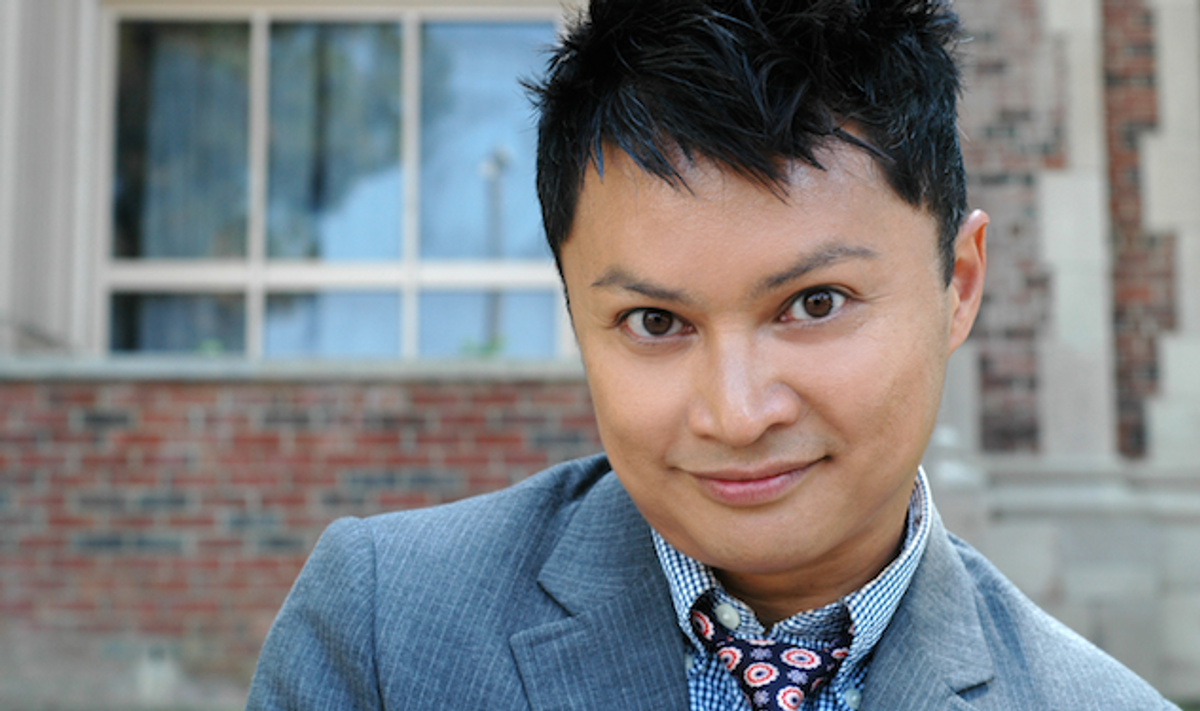




 ICON HELP MYSELF
ICON HELP MYSELF





































